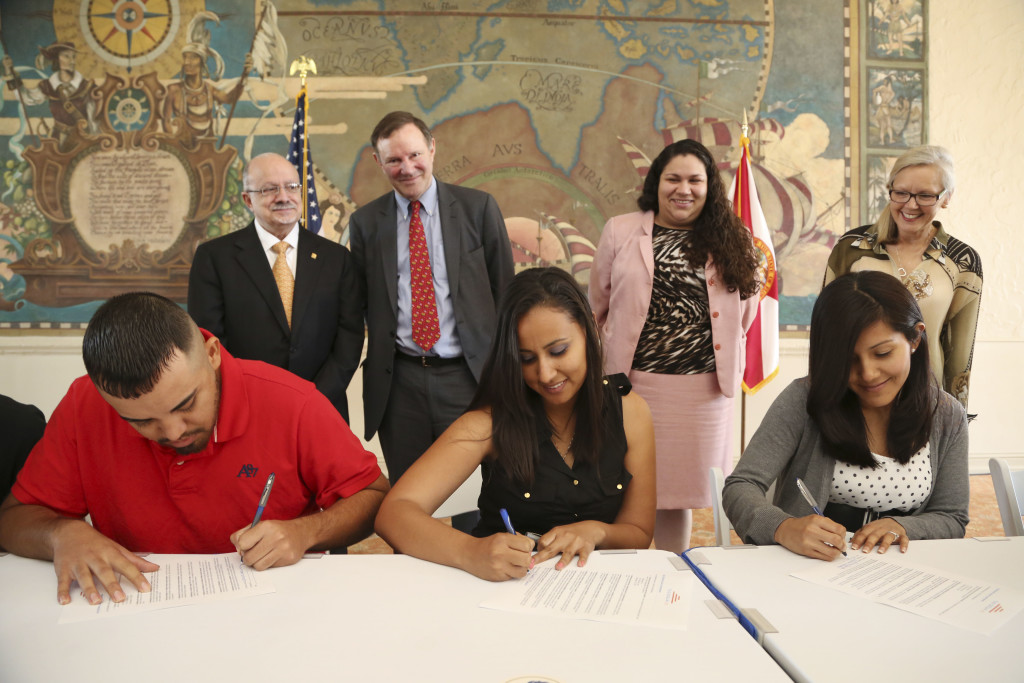For Students With Deferred Action Status, Optimism And Frustration
Yesmyn Alcarazo, a mass communications student at Kendall Campus, knew he lacked legal documentation to reside in the US, but he didn’t truly realize its effects until high school.
“I remember the first time that it really hit me,” Alcarazo said. “It was toward the end of high school when I was trying to get my license and I had to give my social security number.”
Alcarazo could not.
He did not have the document.
He stalled.
He made excuses.
In the end he walked away without the essential ticket to teenage freedom. This simple milestone and so many others remained out of reach.
“Once deferred action came in, every door became open,” said Alcarazo who traveled to the U.S. in 2002 from Peru as a child with his family and stayed.
Hundreds of thousands in his situation have shared in Alcarazo’s sentiments of relief since President Barack Obama’s administration implemented the Deferred Action for Childhood Arrivals (DACA) process back in August 2012.
As of February, more than 638,000 people have applied for DACA, and about 82 percent of those applications have been approved. On average, the agency receives more than 2,000 applications every day.
“It’s a step in the right direction,” said Nicole Roman, an undocumented mass communications student at InterAmerican Campus. “It’s an invaluable gift to everyone to get that reform.”
By applying for deferred action, qualified undocumented immigrants are exempt from deportation and can obtain work authorization as well driver’s licenses for a renewable period of two years. It does not, however, provide an individual with lawful status.
In order to be eligible, on June 15, 2012, applicants had to have been under 31 years of age, come to the United States before their sixteenth birthday, and be physically present in the US. They also have to prove continuous residence since June 15, 2007 and either be in school, have graduated from high school in the US, have a GED, or be an honorably discharged veteran. The application entails a non-refundable fee of $465 as well.
“For many young people it’s been a lifesaver, they’ve been able to come out of the shadows, finally have some semblance of a normal life,” said Cheryl Little, executive director of the Miami-based Americans for Immigrant Justice.
Despite the benefits that deferred action has brought, there continues to be criticism and frustration over the fact that it is costly, temporary relief. The application procedure requires caution because of its restrictions, strenuous requirements and steep application fee.
There is also no certainty as to if undocumented immigrants, commonly referred to as “DREAMers” in memory of the DREAM bill that was blocked by the Senate in 2010, will be granted permanent residency or a pathway to citizenship.
“DACA is just a little patch on someone’s injury, it’s nothing more than a coverup for all of the things happening in the immigration issue,” said Brayan Vazquez, an undocumented student at North Campus. “It’s like giving a dog a bone without meat when they originally promised a banquet.”
Early this month, Speaker of the House John Boehner said that he doesn’t expect any immigration reform bill to pass in 2014. In response, immigrant advocates are increasingly pressuring Obama to expand DACA to include more of the estimated 12 million undocumented immigrants.
Activists are also pressuring states like Florida to join 14 other states that have their own versions of the DREAM act passed in state legislatures, which lowers the cost of higher education for undocumented immigrants.
Last semester Miami Dade College began offering undocumented immigrants who have been granted deferred action the opportunity to have the out-of-state portion of their tuition waived. College officials say they don’t have total numbers for undocumented students as they are classified as out-of-state students.
In addition, on Feb. 11 MDC officials announced they had offered scholarships to 22 high-achieving undocumented students, including Alcarazo, in partnership with TheDream.US, a national organization that is giving 39 similar grants nationwide.
“Today, TheDream.US is sending the message to all dreamers that you are not alone,” College president, Eduardo J. Padrón told the students at a signing ceremony at the Freedom Tower. “You will have the opportunity to pursue your dreams and to reach your fullest potential.”
Staff writer Pia Molina contributed to this report.




